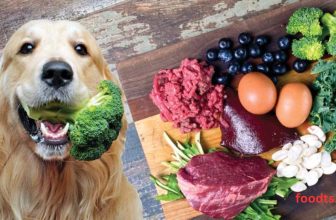What Is the Best Dog Food? The Best Guide

What Is the Best Dog Food: Choosing the right dog food is one of the most important decisions you can make as a pet owner. A well-balanced diet ensures your dog stays healthy, active, and happy. But with so many options on the market, how do you know what’s best for your furry friend?
In this guide, we’ll break down everything you need about dog food, from the best brands to homemade recipes and tips on selecting high-quality nutrition. Whether you have a growing puppy, a senior dog, or a pet with a sensitive stomach, we’ve got you covered.
Why Choosing the Right Dog Food Matters for Your Pet’s Health
Dog food isn’t just about filling your pup’s bowl; it’s about providing essential nutrients that support their overall well-being. High-quality dog food helps with:
- Healthy digestion
- Strong bones and joints
- A shiny coat and healthy skin
- Energy and vitality
- A longer, happier life

The Difference Between High-Quality and Low-Quality Dog Food
Not all dog foods are created equal. Many commercial brands use fillers like corn, wheat, and soy, which offer little nutritional value. High-quality dog food, on the other hand, contains real meat, vegetables, and essential vitamins to support your dog’s health.
Look for dog foods that have:
- High protein content from real meat
- Essential fatty acids (Omega-3 and Omega-6)
- Whole grains or grain-free options
- No artificial additives, colors, or preservatives
Quick Tips for Selecting the Best Food for Your Dog
- Check the ingredient list: The first ingredient should always be a high-quality protein source.
- Avoid artificial preservatives: Stay away from BHA, BHT, and ethoxyquin.
- Consider your dog’s age and breed: Puppies, adults, and senior dogs have different nutritional needs.
- Consult your vet: If your dog has special dietary needs, a vet can help you choose the best food.
Best Dog Food Brands
With countless dog food brands on the market, how do you know which ones are the best? We’ve reviewed the top brands based on nutritional value, ingredient quality, and customer satisfaction.

What Makes a Dog Food Brand Reliable?
A good dog food brand prioritizes:
- High-quality ingredients
- AAFCO nutritional standards
- Positive reviews from pet owners
- Recommendations from veterinarians
How We Chose These Top Brands
Our list is based on expert recommendations, vet approvals, and real dog owner experiences. We also analyzed nutritional content and ingredient quality to ensure each brand meets high standards.

Top-Rated Dog Foods for Every Need
Every dog is different, so their food should match their specific dietary needs. Here are the best dog food options based on various health and lifestyle factors.
Best Overall Dog Food
Brand: Hill’s Science Diet
- Vet-recommended
- Balanced nutrition with high-quality protein
- Rich in essential vitamins and minerals
Best High-Protein Dog Food
Brand: Orijen Original
- High meat content for muscle support
- No artificial preservatives
- Grain-free option for better digestion
Best Grain-Free Dog Food
Brand: Blue Buffalo Wilderness
- Rich in Omega-3 and Omega-6 for a healthy coat
- No corn, wheat, or soy
- Supports immune health
Best Wet Dog Food vs. Dry Dog Food
Wet food provides hydration and is easier to chew, while dry food is more convenient and better for dental health. Some great options include:
- Best Wet Food: Blue Buffalo Homestyle Recipe
- Best Dry Food: Wellness Core High-Protein
Best Dog Food for Puppies
Brand: Purina Pro Plan Puppy
- DHA for brain development
- High protein for growing muscles
- Contains probiotics for digestion
Best Dog Food for Sensitive Stomachs
Brand: Royal Canin Digestive Care
- Easily digestible proteins
- Prebiotics for gut health
- Reduces digestive discomfort
Best Affordable Quality Dog Food
Brand: Iams ProActive Health
- High protein at an affordable price
- No artificial preservatives
- Supports strong bones and teeth
Best Organic and Natural Dog Food
Brand: Tender & True Organic
- USDA-certified organic ingredients
- No antibiotics or artificial colors
- Made with real meat and vegetables
Homemade Dog Food: Is It Better?
Some pet owners prefer homemade meals for their dogs. While this can be a great option, ensuring a balanced diet is essential.
Benefits and Risks of DIY Dog Food
Benefits:
- Full control over ingredients
- No artificial preservatives
- Fresh, whole-food nutrition
Risks:
- Risk of nutritional deficiencies
- Time-consuming preparation
- Requires vet guidance to ensure balance
Simple, Vet-Approved Recipes
Chicken and Rice Recipe:
- 1 cup boiled chicken (shredded)
- 1/2 cup cooked brown rice
- 1/2 cup steamed carrots
- Mix and serve in appropriate portions
-

What Is the Best Dog Food? The Best Guide %currentyear% – foodts
How to Choose the Right Dog Food for Your Pet
Picking the right dog food requires careful consideration of ingredients, nutrition, and quality.
Reading Ingredient Labels Like a Pro
- Look for real meat as the first ingredient
- Avoid by-products and fillers
- Choose whole foods over artificial ingredients
Avoiding Harmful Additives and Fillers
Stay away from:
- Artificial colors and flavors
- Cheap fillers like corn, wheat, and soy
- Unnecessary preservatives
The Importance of AAFCO Certification
AAFCO ensures that pet food meets the minimum nutritional requirements for dogs. Always check for this certification.
Vet-Recommended Nutrients for Longevity
- Protein: Supports muscle maintenance
- Omega fatty acids: Promotes a healthy coat
- Probiotics: Helps with digestion
- Glucosamine & chondroitin: Supports joint health
Final Thoughts: What’s the Best Dog Food for Your Pup?
Every dog is different, so the best dog food depends on their unique needs. High-quality ingredients, proper nutrition, and vet recommendations should always guide your choice.
Questions and Answers: What Is the Best Dog Food
Q1. What is the healthiest dog food brand?
A1. Hill’s Science Diet, Blue Buffalo, and Orijen are among the top choices due to their high-quality ingredients and vet approvals.
Q2. Should I feed my dog grain-free food?
A2. Grain-free food is beneficial for dogs with grain allergies, but it’s not necessary for all dogs. Always consult your vet before switching.
Q3. How do I know if my dog’s food is good quality?
A3. Check the ingredient list: real meat should be the first ingredient, followed by whole foods like vegetables and healthy fats.
Q4. Is homemade dog food better than store-bought food?
A4. Homemade food can be healthy, but it must be properly balanced. Store-bought brands formulated by veterinary nutritionists ensure your dog gets the right nutrients.
Q5. How often should I switch my dog’s food?e dog food better than store-bought food?
A5. If your dog is healthy and doing well on their current food, there’s no need to switch. If you do change foods, do it gradually over a week to avoid digestive issues.
Encouraging Pet Owners to Consult a Vet
Your vet knows your dog’s specific health needs and can recommend the best food. Always discuss any dietary changes with a professional. By following these guidelines, you’ll ensure your dog gets the best nutrition possible. A well-fed dog is a happy, healthy companion for years to come!







